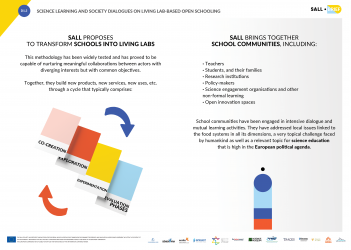“Transforming European schools into Living Labs will help rethink the current EU educational system and eventually redesign EU’s government’s shared goals and challenges,” states one of the main conclusions of the Schools As Living Labs project, the most recent and most comprehensive effort launched under the Horizon 2020 program in the field of Living Labs in Open Schools.
Between 2020 and 2023, the Schools As Living Labs project has been developing a concrete and efficient approach to science education programs. During three years, the project has fostered collaboration between schools and local communities based on the living-lab methodology.
To do so, the partners involved in the consortium have worked on developing the SALL methodology by building upon the existing OSOS open schooling framework and integrating the living lab methodology as a focused technique for fostering school-based innovation.
In doing so, the SALL project has made a tangible and ready-to-use method available for European schools. For that, the project’s outcomes have taken the shape of materials to be used as guidance in identifying and involving schools, educators, students, their families, and local communities, selecting topics, setting up the living lab methodology in the classroom, implementing it, and evaluating its effectiveness. Policymakers have also been targeted as crucial audiences and potential prescribers of the SALL methodology.
To that end, dialogue, mutual learning, and co-creation between the partners and linked third parties have been essential. In total, 12 countries have taken part in SALL (Belgium, Croatia, Cyprus, Estonia, France, Greece, Israel, Luxembourg, the Netherlands, Portugal, Serbia, and Spain), representing diverse realities and worlds: from schools to universities, science museums, research organisations, NGOs and business.
The SALL consortium started its work in 2020 by building a framework and a methodology. It has ended with identifying a policy roadmap for supporting the establishment of Living Labs in Open Schools while engaging a strong international community.
Living Lab: A new methodology for schools
Living Lab can be defined as a methodology to develop new innovations through a user-driven process rooted in co-creation.
This definition emphasizes the role of the user in the Living Lab approach. Instead of being the “target” of an innovative solution, the users are its co-creators so that the solution can be tailor-made to their actual needs and context and adequately match their values and ethical choices.
This methodology often emphasizes the idea of cycles comprising prototyping and testing solutions.
Open and ready-to-use materials containing the key points of the SALL methodology are available on the School of the Future online platform.
This platform is where the different international SALL activities and initiatives taken by schools have been identified and listed.
In total, 437 schools and 429 teachers have participated in the activities related to testing the SALL methodology and have organized 79 events. Creating and engaging a strong international educational community is precisely one of the greatest achievements of SALL.
Five crucial outcomes to implement the SALL methodology
The Schools as Living Labs project has been pursuing the most efficient way to bring other educational communities on board to spread the living lab methodology.
Communities, organisations, and professionals who want to implement the living-lab methodology and foster a more efficient and flexible educational approach now have 5 crucial tools to do so:
- The SALL TOOLBOX, an easy-to-use collection of the results of the SALL project: This modular set of materials provides access to valuable information, inspiring success stories, and innovative best practices.
- The Roadmap for Living Labs in Education, is designed to inspire and help transform how one plans and implements education projects using the Living Lab methodology.
- The Policy Brief, encompassing the opinions and recommendations of experts from more than 12 EU-funded projects on innovative science education practices
- The SALL Canva, presents a useful summary of a concrete approach to science education programs
- The SALL Portfolio of Schools as Living Labs Projects that have been implemented in schools across Europe
All these tools can be downloaded and easily shared through the dedicated SALL community in Zenodo, an innovative and easy web platform, which allows for upload, curation, and sharing of the research data, as well as through the Schools As Living Labs’ website (www.schoolsaslivinglabs.eu).
Finally, although the SALL consortium has spread its optimistic view about the effectiveness of the open schooling models, the project has also confirmed in its conclusions that more investment and training are necessary so that policymakers can implement sustainable educational strategies to foster experimental learning, interdisciplinary collaboration, and community engagement.

